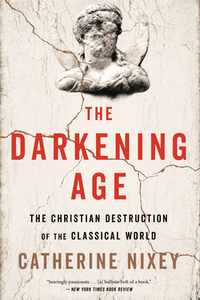You need to sign in or sign up before continuing.
Take a photo of a barcode or cover
261 reviews for:
The Darkening Age: The Christian Destruction of the Classical World
Catherine Nixey
261 reviews for:
The Darkening Age: The Christian Destruction of the Classical World
Catherine Nixey
I read plenty of history books and articles and one habit I took one early was to check where a historian was coming from. What's their background? Their political affiliation? It shouldn't matter in their writing, but it's naive to think it doesn't. Nixey is no exception. She's a journalist, not a trained historian and that shows in her writing (and also why this did not get 5 stars). It's not dry and historical, not overly factual, but rather with a sense of sensationalism.
Why is that bad? Because she is making a huge claim here. Let me be clear. I am an atheist, veering towards anti-theism. I abhor religion, because of all the nasty shit it has done, for the corrupt power-structure that it is, for the paedophilia, the destruction of people and pretty much anything else you can think of that you would normally dislike. So I'd love to chalk up the destruction of the Classical World to Christianity. I wouldn't put it past them. But Nixey tells a rather one-sided story here and that costs a start, especially when you claim to write history.
Why is that bad? Because she is making a huge claim here. Let me be clear. I am an atheist, veering towards anti-theism. I abhor religion, because of all the nasty shit it has done, for the corrupt power-structure that it is, for the paedophilia, the destruction of people and pretty much anything else you can think of that you would normally dislike. So I'd love to chalk up the destruction of the Classical World to Christianity. I wouldn't put it past them. But Nixey tells a rather one-sided story here and that costs a start, especially when you claim to write history.
Really like the premise but gets so repetitive, I feel like they don’t make any new points in the second half of the book
informative
When I requested The Darkening Age I had high hopes of truly enjoying the read. Unfortunately, I am not convinced that Nixey achieved her goal. I did enjoy the parts where she stayed focused, and it is clear that early Christianity was full of violence and condemnation for any they felt were different. I am just not sure that she added to the conversation that historians already have going.
2.5 stars
this book offers a very interesting assortment of essay-like chapters that provide background information on the rise of Christianity and it’s destructive force upon much of what the classical world (more so the Roman Empire) stood for. unfortunately, within that structure broader, overarching themes and arguments get lost, and the ultimate conclusion falls flat. What exactly was the aftermath? In what way did Christianity push the world into the "dark ages"? With a strong focus on the destruction of monuments and the disapproval of some facets of roman culture, a lot remains unanswered. The constant jumps throughout centuries add to this lack of a clear red threat unfortunately.
I do, however, also want to highlight the writing style and tone of the book, it had a good flow to it!
this book offers a very interesting assortment of essay-like chapters that provide background information on the rise of Christianity and it’s destructive force upon much of what the classical world (more so the Roman Empire) stood for. unfortunately, within that structure broader, overarching themes and arguments get lost, and the ultimate conclusion falls flat. What exactly was the aftermath? In what way did Christianity push the world into the "dark ages"? With a strong focus on the destruction of monuments and the disapproval of some facets of roman culture, a lot remains unanswered. The constant jumps throughout centuries add to this lack of a clear red threat unfortunately.
I do, however, also want to highlight the writing style and tone of the book, it had a good flow to it!
A highly enjoyable and informative read. I confess that we have similar readings of many saints' lives. I do disagree with her assertion, at the close, that Christianity at large forgot that there ever were other challenges to the belief system. One only has to glance through a compendium of the wide range of medieval heresies to understand just how wide the variety of disagreement and challenge to hegemonic Christianity became. I still overall loved this book.
The Darkening Age is an interesting one. As a simple change of perspective, it’s highly effective. As a history book, maybe a little less so? I’m not sure.
What The Darkening Age does very well is to highlight that many of the early Christian saints from the Middle East have had significant image rehabilitation. That history is written by the winners and that while many Christians were martyred they did not go gentle into that good night. In fact, many Greeks/Romans lived in fear of marauding Christians. It’s not a book that can establish right, wrong, or motive. It just highlights that not all Christians were lambs to the slaughter for Roman amusement and that, along the way to the top, they destroyed a great number of historical artefacts that they regarded as sinful in a way comparable to the Taliban’s infamous use of dynamite against ancient Buddhist sculptures.
Ireland, in particular, is very fond of the image of monks transcribing ancient texts and preserving knowledge. What this book brings to light is the number of texts that were lost or suppressed. That there’s a very strong correlation between the Classical works that survived to the modern era and their palatability to Christian sensibilities. The fun side of the Romans and Greeks appear to have been consciously expunged and so we’re mostly left with the mere idea that the Stoics had somebody to debate or to give out about, rather than what these opposing voices actually said. It makes for tough reading, the amount of knowledge that was lost.
This book isn’t without its flaws though. There’s definitely a romanticising of the Classics at play and the Christians are almost cartoonishly evil. Apparently the author’s main source isn’t that credible. I’m not entirely convinced by that. The idea of a Victorian historian being disparaged for presenting a less-Christian version of history is anything but unlikely. Smarter people than me, however, have pointed out that irrespective of the quality of the sources for this book, there aren’t very many, and that’s a killer. So as a thought piece or as a pop history that awakens somebody to historical possibilities? I’m in. I feel it shouldn’t be taken as gospel though...
What The Darkening Age does very well is to highlight that many of the early Christian saints from the Middle East have had significant image rehabilitation. That history is written by the winners and that while many Christians were martyred they did not go gentle into that good night. In fact, many Greeks/Romans lived in fear of marauding Christians. It’s not a book that can establish right, wrong, or motive. It just highlights that not all Christians were lambs to the slaughter for Roman amusement and that, along the way to the top, they destroyed a great number of historical artefacts that they regarded as sinful in a way comparable to the Taliban’s infamous use of dynamite against ancient Buddhist sculptures.
Ireland, in particular, is very fond of the image of monks transcribing ancient texts and preserving knowledge. What this book brings to light is the number of texts that were lost or suppressed. That there’s a very strong correlation between the Classical works that survived to the modern era and their palatability to Christian sensibilities. The fun side of the Romans and Greeks appear to have been consciously expunged and so we’re mostly left with the mere idea that the Stoics had somebody to debate or to give out about, rather than what these opposing voices actually said. It makes for tough reading, the amount of knowledge that was lost.
This book isn’t without its flaws though. There’s definitely a romanticising of the Classics at play and the Christians are almost cartoonishly evil. Apparently the author’s main source isn’t that credible. I’m not entirely convinced by that. The idea of a Victorian historian being disparaged for presenting a less-Christian version of history is anything but unlikely. Smarter people than me, however, have pointed out that irrespective of the quality of the sources for this book, there aren’t very many, and that’s a killer. So as a thought piece or as a pop history that awakens somebody to historical possibilities? I’m in. I feel it shouldn’t be taken as gospel though...
challenging
informative
reflective
fast-paced
challenging
informative
slow-paced
While I agree with her thesis, I found it very difficult to read her argument. It felt more like I was reading a series of ranting blog posts rather than a long form, well-planned journalistic piece. At times, she sounds like some of the Christians she (correctly) rails against.



